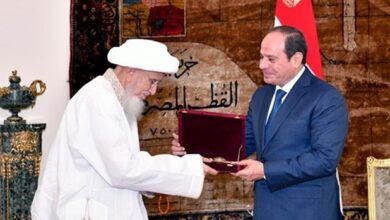General Abdel Fattah al-Sisi currently wears three hats: leader of the armed forces, minister of defense and deputy prime minister. At the close of 2013, Egyptian politics is dominated by one question: will he take off those three hats in order to assume the presidential throne?
While visiting Egypt this month, I heard the same contradictory argument again and again. First, his seeking the presidency would be a mistake for himself, the military, and the country. Second, there are no other options.
This contradiction points to the central problem of Egyptian politics in the post-July 3 era. It might at first seem that this problem is the personalization of politics–the fact that there is one indispensable person who can define how Egypt will be ruled with the stroke of a pen, and the fact that much of recent political discussion is focused on personalities: who is an angel and who is a devil.
These issues are in part valid concerns, but they distract from a more profound truth: Egypt is not governed by angels or devils, but by institutions. These institutions, while powerful, serve society when it is in their interest. They do not accept guidance from society but seek to guide it.
Egypt’s leading figures are all products of institutions. General Sisi is a product of the Egyptian military; he did not produce it. The acting president, Adly Mansour, is a product of the Constitutional Court. The judiciary is led by figures who have spent the entirety of their adult lives within judicial circles. Al-Azhar is led by Azharis–the creation of the Senior `Ulama Council and closer cooperation with Dar al-Ifta and the Ministry of Religious Affairs furthers this centralization. The foreign minister is a career diplomat. The minister of justice is a senior judge.
Egyptian politics have not always been this way. It began in the 1970s, when President Anwar al-Sadat promised the people “a state of institutions”—insitutions that were semi-autonomous and no longer micro-managed by the presidency and commanded by the Arab Socialist Union. Powerful segments of the state were able to gradually carve out islands from themselves under this framework. Their authority was still tempered by Sadat and his successor Hosni Mubarak, who both had considerable control over the institutions. But since January 2011 these bodies seem to be operating independently to a far greater degree. They don't see themselves as working towards their own interests, rather considering these interests as synonymous with those of the nation.
General Sisi did not create this problem, but his gravity in the political sphere exacerbates it. President Sisi is poised to be a powerful figure, taking command of the central institution in Egyptian political life for sixty years–the presidency. He might be able to re-unify the state apparatus, and he might initially have a popular mandate to do so. But in the end, this would most likely lead to the same presidential autocracy that Egyptians revolted against in January 2011.
If Sisi was minister of defense alongside an elected president, there would probably be a slightly different outcome, especially under the terms of the proposed constitution. Critical institutions of the Egyptian state–the military, security agencies, judiciary and Al-Azhar, which all see themselves as above politics–would likely operate autonomously of each other. And they would be immune to oversight by democratic institutions, thereby deepening the Balkanization of the Egyptian state.
Until Egyptian politics are reborn, and Egyptian society produces leaders and movements who have the capability of and interest in simultaneously expressing their differences and in managing them through an established political process with clear rules and protections for all, society will remain in servitude of the state rather than the other way around. As long as Egyptians refer to each other in dehumanizing terms–as kuffar, fascists, sheep, liars and murderers–a different future is unlikely. Egyptians will be left only with the choice of the kind of autocracy that rules them. And they may not be the ones making that choice.




